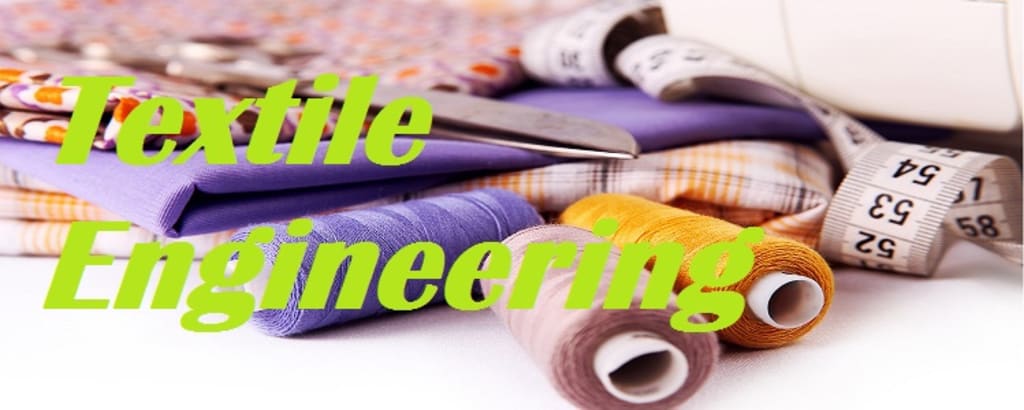Textile Engineering
What is Textile Engineering?

Textile Engineering
Textile Engineering is in growing demand due to diverse cultures and traditions around the world and it is one of the most popular disciplines in engineering/technology. "Textile Engineering" is a big research field of technology that deals with all activities of producing textile fabric & yarns which are involved in the process of textile manufacturing. It includes process engineering that spins around the garment, colour, and fabric line of industries.
The technology and science in Textile Engineering comprise designing and controlling all aspects of fibre, textile & apparel processes, fibre, clothing products, and machinery. Textile engineers are involved in many aspects of textile manufacturing, from process engineering, R&D, production control, technical sales, quality control and types of equipment to procedures that create all these fibres, fabrics and Yarns.
Many public and private universities/colleges have launched specialization courses in Textile Manufacturing/Textile Engineering. After successful completion of the Textile Engineering course, there will be plenty of varied job opportunities have emerged for those trained in this domain.
Skilled textile engineers are required by top companies. If a candidate is planning for a career in this field then he/she should begin with an undergraduate programme followed by a master's programme in Textile Engineering.
Eligibility Criteria for Textile Engineering
Admission Process for Textile Engineering
Top Entrance Exams for Textile Engineering
Skills Required to Pursue Textile Engineering
Textile Engineering Programmes
Subjects of Textile Engineering
Top Colleges for Textile Engineering
Job Roles, Growth Prospects and Salary for Textile Engineering
Top Recruiters for Textile Engineering
Frequently Asked Questions (FAQs) on Textile Engineering
Eligibility Criteria for Textile Engineering
Engineering aspirants who aim to pursue the Textile Manufacturing/Textile Engineering course must fulfil the following eligibility criteria:
Course Eligibility
Diploma If a textile engineering aspirant seeking admission to a diploma course then he/she must have passed class 12th in the Science stream (with Physics, Mathematics, and Chemistry) with around 50% aggregate marks.
Undergraduate In order to get into undergraduate-level Textile Engineering, an applicant should possess passed class 12th with Physics, Mathematics, and Chemistry. If candidates want to pursue a degree in the IITs exclusively, it is mandatory to have passed the Joint Entrance Examinations JEE Main.
Postgraduate In order to pursue a post-graduate level Textile Engineering course, he/she must have a BTech or BE degree.
Doctorate PhD can be pursued after the completion of a Master's or PG level Textile Engineering course in Textile Engineering.
Also Read: Top Textile Engineering Colleges in India
Admission Process for Textile Engineering
Here a candidate must understand that the admission process will be different for each type of programme. Have a look:
Course Admission Process
Diploma In this case, the admission process in Textile Engineering depends on the institute/college. Few of them might provide admission on merit while few follow the direct admission process.
Undergraduate Institutes providing admission to Textile Engineering BE/ BTech courses mostly follow the merit-based admission process. Marks scored in relevant entrance tests like JEE Main entrance exam, Institute-based entrance tests, state-wise, etc. are taken into account. For, NRI or donation quota applicants, the same criteria is followed, however, this condition might be different for each institute/college
Postgraduate The main entrance for admission to a Master's is the GATE entrance exam. Candidates seeking admission must pass the required entrance exam and have a valid GATE score followed by a round of group discussion.
Top Entrance Exams for Textile Engineering
Some of the top entrance exams for Textile Engineering are as follows:
Entrance Exams for Textile Engineering
JEE Mains TNEA
MHT CET AP EAMCET
JEE Advanced TS EAMCET
COMEDK UGET KCET
Confused about which Course & Career to choose?
Take Shiksha Career Test and make the right Course & Career decision!
Get Unique Recommendations based on your Personality, Hidden Strengths and Natural Abilities
Skills Required to Pursue Textile Engineering
To be able to pursue a Textile Engineering programme, candidates should possess the right set of skills to acquire success in the future. Take a look at some of these below.
Skillset for Textile Engineering
Creativity
Excellent Detailing
Technical Knowledge
Good Communication Skills
Persuasive Ability
Resilience
Excellent Patience Level - able to work long hours of work
Visual Imagination
An interest in fashion and textiles
Knowledge and understanding of different textile processes and techniques
Textile Engineering Programmes
Candidates seeking admission to Textile Engineering programmes for the next academic cycle can have a look at available courses.
Bachelor of Technology in Textile Chemistry
Bachelor of Engineering in Textile Technology
Bachelor of Technology in ManMade Fiber Technology
Diploma in Textile Technology/Textile Engineering
Bachelor of Technology in Textile Technology
Bachelor of Technology in Textile and Carpet Technology
Diploma in Fabrication Technology & Erection Engineering
Master of Technology in Textile Chemistry
Master of Engineering in Textile
Master of Technology in Textile Technology
Subjects of Textile Engineering
Textile Engineering is inclusive of Textile Chemistry, Textile Production and Textile Technology. Have a look at the core subjects of Textile Engineering
Subjects in Textile Engineering
Textile Fibre Chemical Processing of Textiles
Yarn Formation Textile Testing & Instruments
Fabric Formation Processing at Textile Lab
Computer Applications in Textiles Information Technology in Textile
Design & Structure of Fabric Textile Fabrication
Read More: Syllabus for Textile Engineering
Top Colleges for Textile Engineering
Have a look at the list of some of the top colleges to pursue Textile Engineering:
Name of The Institute City
Anna University Chennai
Veermata Jijabai Technological Institute Mumbai
Shri Vaishnav Vidyapeeth Vishwavidyalaya Indore
Institute of Chemical Technology Mumbai
NIT Jalandhar - Dr . B. R. Ambedkar National Institute of Technology (NITJ)
Jalandhar Indian Institute of Technology Delhi
Visvesvaraya Technological University Belgaum
R V College of Engineering Banglore
Maharaja Sayajirao University of Baroda Vadodara
PSG College of Technology - PSGCT Coimbatore
Job Roles, Growth Prospects and Salary for Textile Engineering
If we talk about India, there are two major sectors under textile engineering - Handloom and Mechanized. Now, have a look at some of the job profiles/positions that a candidate can choose from after completion of a course in Textile Engineering:
Operation/Management Trainee
Quality Control Supervisor
Medical Textile Engineer
Process Improvement Engineer
Production Engineer
Let's have a quick look at the details of job profiles and roles available for textile engineers:
Job Profile
Job Description
Average Annual Salary*
Medical Textile Engineer
In this profile, the primary responsibility includes developing fabrics for clothing, household items, medical supplies, and furnishings. The work also involves liaising with and providing technical advice to marketing, purchasing, design and production staff.
INR 3.10 LPA
Production Engineer
Production Engineers are responsible for overseeing the production of a product, typically in an indoor factory setting. The responsible engineer is also required to ensure that production demands are met cost-effectively and efficiently.
INR 4-4.5 LPA
Operation/Management Trainee
The operation trainee work under the supervision of the seniors for merchandising and one can learn the process of QA, Production Planning, Production support, Industrial engineering, and others.
INR 1.98-2 LPA
Quality Control Supervisor
The primary responsibility of the Quality Control Supervisor is to supervise the handling of sample evaluation and production approval by reviewing the measurement, fitting, workmanship, quality, accessories, and other factors
INR 1.7-2 LPA
Process Improvement Engineer
Process Improvement Engineer handles the process improvement engineer includes performing root-cause analysis, creating detailed reports about the improvement issues and executing process improvement actions.
INR 4.38 LPA
Top Recruiters for Textile Engineering
Some of the popular companies recruiting Textile Engineering graduates are:
Bombay Dyeing
Bhilwara Group
Mysore Silk
Rajasthan Petro Synthetics
JCT Limited
RIL Textiles
Lakshmi Mills
JCT Mills
Reliance Textiles
Fabindia
Grasim Industries
Arvind Mills Ltd
Mafatlal Denim
Raymond Group etc...






Comments
There are no comments for this story
Be the first to respond and start the conversation.